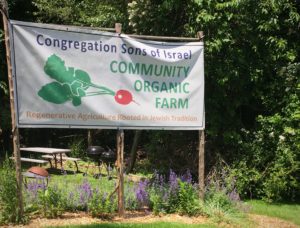 The COVID pandemic has laid bare our vulnerabilities with regard to so many of life’s essentials. Exposure to the virus aside, our mental health and sense of well-being, the fulfillment of our spiritual needs, our access to the right foods (and at reasonable costs), our mobility, and our ability to interact with friends and family are but a few of the critical challenges we have encountered.
The COVID pandemic has laid bare our vulnerabilities with regard to so many of life’s essentials. Exposure to the virus aside, our mental health and sense of well-being, the fulfillment of our spiritual needs, our access to the right foods (and at reasonable costs), our mobility, and our ability to interact with friends and family are but a few of the critical challenges we have encountered.
And then there is the unusual case of the Organic Farm at Congregation Sons of Israel in Briarcliff Manor, NY.
Beginning in 2016, and led by Rabbi Steven Kane and members Ryna Lustig, Fred Schulman, Jill Greenstein, and David Leavitt, CSI, driven by an effort to expand spiritual, educational, and recreational connections to the synagogue for its members, and acknowledging a renewed interest in organic produce and working the land, about two acres of synagogue land were cleared for farming. They drilled a well for irrigation, built a chicken coop (with fresh, free-range eggs available every day), divided and fenced two fields (one Commercial Field for volume production, and one Community Field with 36 beds that could be rented for each season to members of the congregation who plant their own produce and flowers and tend to their own garden).
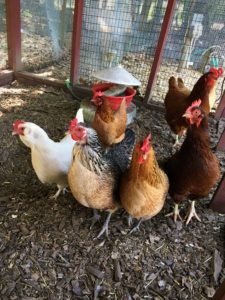 CSI, like all houses of worship, has been closed for these past months, but the Organic Farm has been alive with activity. Fields have been prepared, kale and herbs are already being harvested, tomatoes and other vegetables have been planted, 16 beds in the Community Field have been rented and those families have been actively working their gardens, and a new flock of an additional 15 chickens has recently arrived.
CSI, like all houses of worship, has been closed for these past months, but the Organic Farm has been alive with activity. Fields have been prepared, kale and herbs are already being harvested, tomatoes and other vegetables have been planted, 16 beds in the Community Field have been rented and those families have been actively working their gardens, and a new flock of an additional 15 chickens has recently arrived.
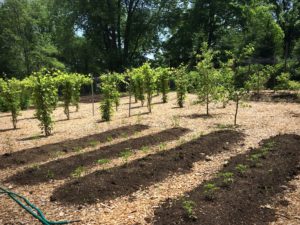 At all times being cautious of pandemic concerns, the open areas of the Farm’s two acres provide plenty of room for people to work and enjoy at a distance. All watering and tools are provided by CSI to the Commercial Field volunteers and Community Field renters.
At all times being cautious of pandemic concerns, the open areas of the Farm’s two acres provide plenty of room for people to work and enjoy at a distance. All watering and tools are provided by CSI to the Commercial Field volunteers and Community Field renters.
As the effects of the pandemic became apparent, CSI decided that opening the Farm would be a service both to its members and to the community at large. Involving members in this synagogue-sponsored activity would safely bring members and families into safe and open areas during the spring and summer seasons. Rewarding physical activity, shared with family, would be beneficial for mind, spirit, and body. Working the land and seeing (and eating) the benefit of your labor would provide some light in the darkness. Having these experiences through a synagogue facility would reconnect people with their house of worship.
As CSI made the decision to open the Farm for this season, there were many views. Should it only be opened on a partial basis assuming fewer participants? Should there be fewer plantings since restaurants (the main purchasers of the produce) were not operating? After finding that the pandemic had created food shortages for many of the area’s most vulnerable, the decision was made to not only open the Farm, but to maximize its productivity so that a majority of the harvests could be brought to local food banks and delivered directly to those in the community who are in need.
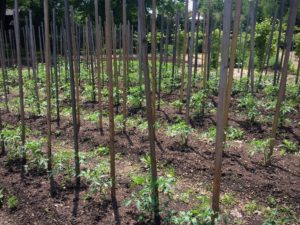 Last season, the Organic Farm harvested 3,282 pounds of produce, with approximately 20% (i.e., 676 pounds) donated to local food banks. This year, the fields have been slightly extended and the soil has been enriched with organic matter, with projections for over 4000 pounds of harvested produce. The Farm will be growing tomatoes, cherry tomatoes, lettuce, sweet pepper, basil, pak choi, chard, zucchini, squash, eggplant, cucumbers, celery, Brussels sprouts, and broccoli rabe. Most of the production will be dedicated to charitable donation to food banks and people in need.
Last season, the Organic Farm harvested 3,282 pounds of produce, with approximately 20% (i.e., 676 pounds) donated to local food banks. This year, the fields have been slightly extended and the soil has been enriched with organic matter, with projections for over 4000 pounds of harvested produce. The Farm will be growing tomatoes, cherry tomatoes, lettuce, sweet pepper, basil, pak choi, chard, zucchini, squash, eggplant, cucumbers, celery, Brussels sprouts, and broccoli rabe. Most of the production will be dedicated to charitable donation to food banks and people in need.
During these challenging times, finally something that is good for body and soul.





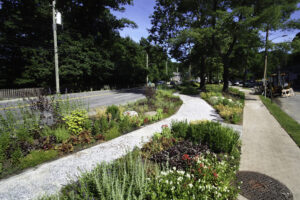

This is amazing I am so happy I came across this article I am looking for organizations or churches, where I can get involved in gardening . I would love to participate In such activities
the churches down south are participating in activities such as gardening, with the congregation and the community